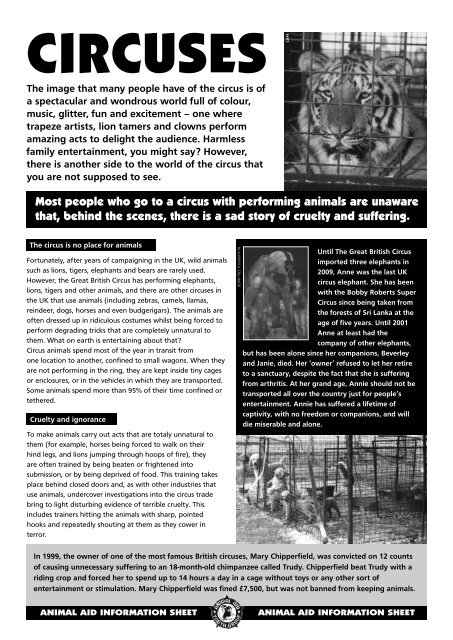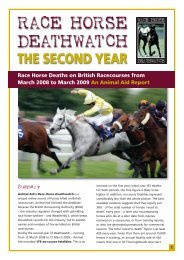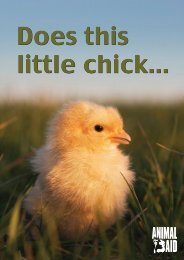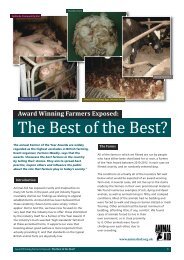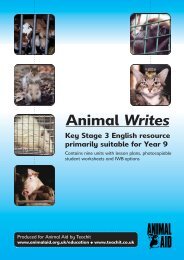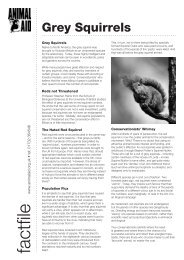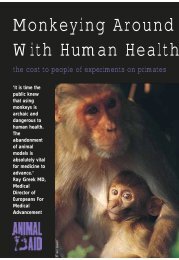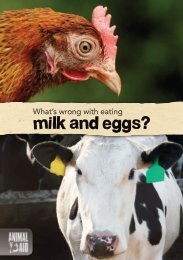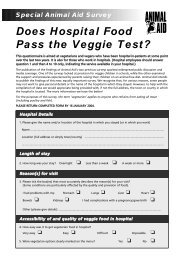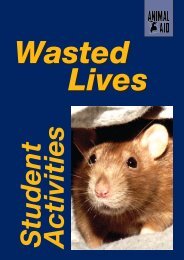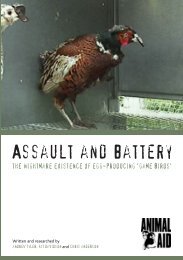Circuses - Animal Aid
Circuses - Animal Aid
Circuses - Animal Aid
- No tags were found...
Create successful ePaper yourself
Turn your PDF publications into a flip-book with our unique Google optimized e-Paper software.
CIRCUSESThe image that many people have of the circus is ofa spectacular and wondrous world full of colour,music, glitter, fun and excitement – one wheretrapeze artists, lion tamers and clowns performamazing acts to delight the audience. Harmlessfamily entertainment, you might say? However,there is another side to the world of the circus thatyou are not supposed to see.CAPSMost people who go to a circus with performing animals are unawarethat, behind the scenes, there is a sad story of cruelty and suffering.The circus is no place for animalsFortunately, after years of campaigning in the UK, wild animalssuch as lions, tigers, elephants and bears are rarely used.However, the Great British Circus has performing elephants,lions, tigers and other animals, and there are other circuses inthe UK that use animals (including zebras, camels, llamas,reindeer, dogs, horses and even budgerigars). The animals areoften dressed up in ridiculous costumes whilst being forced toperform degrading tricks that are completely unnatural tothem. What on earth is entertaining about that?Circus animals spend most of the year in transit fromone location to another, confined to small wagons. When theyare not performing in the ring, they are kept inside tiny cagesor enclosures, or in the vehicles in which they are transported.Some animals spend more than 95% of their time confined ortethered.Cruelty and ignoranceTo make animals carry out acts that are totaly unnatural tothem (for example, horses being forced to walk on theirhind legs, and lions jumping through hoops of fire), theyare often trained by being beaten or frightened intosubmission, or by being deprived of food. This training takesplace behind closed doors and, as with other industries thatuse animals, undercover investigations into the circus tradebring to light disturbing evidence of terrible cruelty. Thisincludes trainers hitting the animals with sharp, pointedhooks and repeatedly shouting at them as they cower interror.BORN FREE FOUNDATIONUntil The Great British Circusimported three elephants in2009, Anne was the last UKcircus elephant. She has beenwith the Bobby Roberts SuperCircus since being taken fromthe forests of Sri Lanka at theage of five years. Until 2001Anne at least had thecompany of other elephants,but has been alone since her companions, Beverleyand Janie, died. Her ‘owner’ refused to let her retireto a sanctuary, despite the fact that she is sufferingfrom arthritis. At her grand age, Annie should not betransported all over the country just for people’sentertainment. Annie has suffered a lifetime ofcaptivity, with no freedom or companions, and willdie miserable and alone.CAPSIn 1999, the owner of one of the most famous British circuses, Mary Chipperfield, was convicted on 12 countsof causing unnecessary suffering to an 18-month-old chimpanzee called Trudy. Chipperfield beat Trudy with ariding crop and forced her to spend up to 14 hours a day in a cage without toys or any other sort ofentertainment or stimulation. Mary Chipperfield was fined £7,500, but was not banned from keeping animals.ANIMAL AID INFORMATION SHEETANIMAL AID INFORMATION SHEET
No protectionThe government announced in 2006 that the <strong>Animal</strong>Welfare Act would ban the use of some animals in circusesfrom 2008. However, the government backtracked anddecided not to introduce a ban under the <strong>Animal</strong> WelfareAct when it came into force.The <strong>Animal</strong> Welfare Act does nothing to change theconditions in which the animals have to travel or live.<strong>Circuses</strong> don’t need to be licensed and there are no circusinspectors. Individual animal trainers need to be registered,but it’s pointless; they basically fill in a form to say they trainanimals - no inspection or qualification is needed.The great circus tradition...Some people say that circuses are part of our traditionalheritage and that ‘real’ circuses must have animals. Thetruth is that more and more people are realising thatcruelty lurks behind the glitz and excitement. Visitornumbers to circuses with animals are dropping, whilsttravelling shows, in which talented and daring humanacrobats and other performers amaze and dazzle the crowdwith their skill and bravery, are becomingincreasingly popular.UK-BASEDCIRCUSESTHAT USEANIMALSBOBBY ROBERTS CIRCUSOne elephant, horses,ponies, dogs, camelGREAT BRITISH CIRCUSThree elephants, lions, tigers, horses, ponies,zebras, camels, pygmy goats, reindeer, llamasPETER JOLLY’S CIRCUSCamels, zebra, donkeys, Ankole bull, ponies,horses, ponies, llamas, goats, geese, ducks,snakes, birds, red foxCAPSCIRCUS MONDAOZebras, camels,llamas, dogs, horses,ponies, donkey,pygmy goatsCIRCUS TYANNAHorses, ponies, dogsand ducksZIPPO’S CIRCUSHorses, ponies,budgiesWHAT YOU CAN DO• Don’t visit circuses that use animals, and• encourage your friends, family and school• to do the same.• Please write to your MP and ask him or her to• support the introduction of a ban on wild •animals in circuses that was promised by the• government in 2006. See the Activist section of• our youth website, or call <strong>Animal</strong> <strong>Aid</strong> to •find out your MP’s name and address. See our• website for points to include in your letter.• Ask if you can have a display at schoolabout circuses.• Write to your local council asking them to• ban animal circuses from their land.• Join the <strong>Animal</strong> <strong>Aid</strong> Youth Group,• and help campaign against animal circuses.• If a circus with animals visits your area,here’s a plan of what you can do:1. Write a letter to your local newspaper, askingpeople to boycott the circus and explain why.2. Ask local shops that have the circus posters ondisplay to take them down.3. If the circus has been ‘fly posting’ or attachingnotices to barriers at road crossings, complain to yourlocal council.4. Ask the Captive <strong>Animal</strong>s Protection Society (seedetails below) for some circus leaflets to hand outwhen the circus opens its gates.For more information contact:The Captive <strong>Animal</strong>s’ Protection Society,PO Box 573, Preston PR1 9WWPhone/fax: 0845 330 3911Email: info@captiveanimals.orgwww.captiveanimals.orgCAPSFor more information on animal issues, please contact: <strong>Animal</strong> <strong>Aid</strong>, The Old Chapel, Bradford St, Tonbridge, TN9 1AWTel: 01732 364546 www.animalaid.org.uk/youth email: youth@animalaid.co.uk


